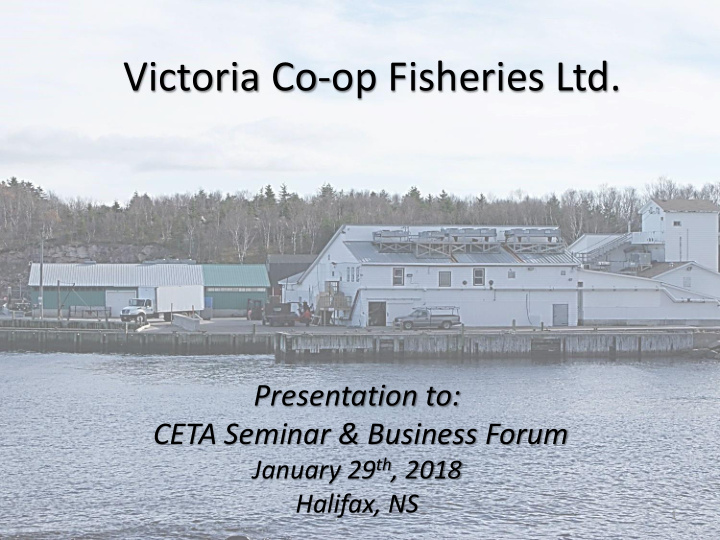



Victoria Co-op Fisheries Ltd. Presentation to: CETA Seminar & Business Forum January 29 th , 2018 Halifax, NS 1
Victoria Co-op Fisheries Ltd. About Us: • Located in North-Eastern Cape Breton • Victoria Co-op Fisheries (VCF) was established in 1955 and incorporated in 1956. • Governed by a ten (10) member Board of Directors, all of whom are Fish Harvesters. Fish Harvesters make up 100% of the ownership of the Co-operative. • We purchase seafood from 127 members and some non-members. The majority of the seafood we buy is processed at our own processing facility. • Victoria Co-op Fisheries Limited has approximately 140 employees and an annual payroll in excess of $3 million dollars. We are the largest employer in Victoria County. 2
Victoria Co-op Fisheries Ltd. About Us continued . . . • We have a fully operational Lobster holding facility capable of holding in excess of 300,000 pounds • Our processing facility handles in excess of 3 million pounds of snow crab and 1.5 - 2 million pounds of lobster annually. • Victoria Co-op has our own transport company (North Victoria Trucking Limited) with a fleet of reefer trailers and trucks which transport our products throughout Canada and the US. • We work closely with our customers to provide quality products in a timely manner and at competitive prices. • Our focus is always on Quality. 3
Victoria Co-op Fisheries Ltd. CETA – European Union • Ongoing discussions were underway between Canada and the EU when VCF began to look at selling in the EU market. • Initially, we conducted some online research regarding possible EU markets using the resources available through NSBI, Agri-Foods, Provincial sites and country-specific sites in the EU and via the trade commissioners based in EU countries. • We also enrolled in various seminars and trade shows to the EU that were sponsored/hosted by NSBI, the NS Department of Fisheries and Aquaculture Agri-Foods and ACOA. • Over the past 4 years we have attended trade shows in Germany, Amsterdam, Austria and Brussels. • Tapping into the EU market is an on-going learning experience. Meeting with various EU companies while attending trade shows is critical to building successful business partnerships. 4
Victoria Co-op Fisheries Ltd. CETA Benefits • CETA has been in effect since February 15 th , 2017. • Prior to CETA taking affect only 25% of EU tariffs were tariff- free. Following CETA’s inception the percentage increased to 98%. • This created an obvious opportunity for the Canadian seafood industry. • The EU offers a huge market (approximately 511 million people) with great potential for export growth for Canadian seafood and other products. 5
Victoria Co-op Fisheries Ltd. CETA Challenges • When VCF first entered the EU market we quickly learned that it was not just as simple as selling our products, in their current format, to the EU. • Consumers in the EU do not necessarily consume seafood products in the same format or quantities as North America. • Packaging itself requires substantial modifications including, language, package sizes, etc. • Within the EU, Austria versus Belgium for example, there are significant differences in how shipments via air and sea are handled. One cannot assume that because it is the EU that the same rules apply for each EU country. 6
Victoria Co-op Fisheries Ltd. Victoria Co-op Fisheries – European Union • Although we have spent a considerable amount of time and energy over the past several years building our presence in the EU, it is a continual learning process. • We will proceed cautiously, one customer at a time, and build on our successes. • For the first time in the history of our company, we are looking at developing packaging for the retail market and not just the wholesale market. • What has been critical to-date, and will continue to be imperative as we move forward, is building relationships with our customers. 7
Recommend
More recommend